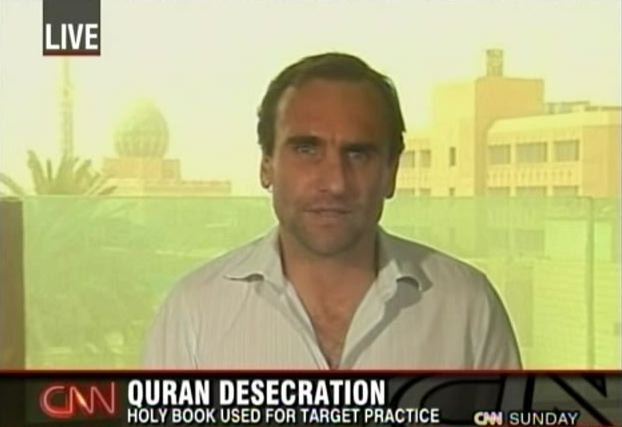SAM: "To desecrate a Holy Quran...really had the potential to just destroy this fragile alliance"

Length: 4:21
LARGE (50.6 MB) ----- SMALL (5.3 MB)
Michael appeared on Sunday Morning to discuss the Quran desecration story.
(It really is frightening how the stupid act of [apparently] one person could ripple out and cause a lot of problems not only in Iraq but elsewhere in the Islamic world. We haven't heard the last of this, I fear...)
ALINA CHO: And we begin this half hour with a delicate situation in Iraq. This morning, the U.S. is apologizing for an American soldier who apparently used the Quran, Islam's holy book, for target practice. Our Michael Ware is following the developments from Baghdad. He joins us now live.
Hey Michael, good morning to you. CNN has obtained copies of the pictures of the Quran, as you well know it shows bullet wounds, an expletive scrawled on one of the pages. In fact, so bad that CNN has elected not to show it. What has the reaction been there and exactly what happened?
MICHAEL WARE, CNN CORRESPONDENT: Well, Alina, that's right. We actually had a CNN presence at a ceremony yesterday where this situation had become so inflammatory over the past week here in Baghdad that the U.S. commander of all forces in the capital had to publicly apologize, virtually prostrating himself before the local community. Now, we first heard of this through the insurgency and then through the local people of this district of Baghdad. What happened is about a week or so ago, at a small-arms firing range near an Iraqi police station, some American soldiers went and did some target practice.
Now, an Iraqi policeman -- according to the military, but an Iraqi militia commander or militia member according to the Iraqis themselves -- went to that range and found what the soldiers had been shooting at. He was absolutely dismayed to find it was a Holy Quran riddled with bullets. And inside was scrawled some expletive graffiti, a reference to the film "Team America." Now, the locals then were obviously enraged but they approached the American commanders.
The American commanders knew how incendiary this act was, so they immediately launched an investigation, and on Saturday, they announced the details of that investigation including the removal of the staff sergeant, a sniper, from Iraq as punishment. And Major General Jeffrey Hammond, the commander of Baghdad, had to say this to the local sheikhs and militia members.
(BEGIN VIDEO CLIP)
MAJ. GEN. JEFFREY HAMMOND, COMMANDER OF BAGHDAD: I come before you today seeking your forgiveness. In a most humble manner I look in your eyes today and I say please forgive me and my soldiers.
(END VIDEO CLIP)
WARE: Now, that shows you how much General Hammond realized this was an explosive issue. Indeed, he went on to say the sniper who had done this had lost his honor and didn't deserve serving the Army or the Iraqis here in Baghdad anymore and then we see the American brigade commander for that area presenting the sheikhs with a new Quran and he kisses it and touches it to his forehead before he hands it over. Alina.
CHO: Michael, you have been in the region for several years, you know this Iraq story better than most. As you well know, for an American audience the most glaring example of abuse by U.S. military would be Abu Ghraib. I'm just wondering how you think this incident compares to that?
WARE: Well, clearly this is not quite an Abu Ghraib. I mean, Abu Ghraib really is in a dimension of its own. However, let's look at other cases around the world where we see that the Islamic world feels that its religion has been slighted. There was a report from Afghanistan that American forces had flushed a Quran down the toilet. Now, the protests and demonstrations that that sparked saw many, many people killed and it set American relations backwards there in that country and in Pakistan.
We also saw the example of the cartoons by the Danish satirist in that newspaper. That inflamed tensions across the Islamic world.
CHO: Yes.
WARE: Now, to desecrate a Holy Quran, filling it full of bullets and then writing an expletive in there, really had the potential to just destroy this fragile alliance that the Americans had worked so hard to forge --
CHO: It most certainly -
WARE: ... with the Sunni insurgency. Alina.
CHO: Most certainly did and a rare mea culpa coming from the commander of U.S. forces in Iraq. Michael Ware, our man in Baghdad. Michael, thank you. T.J..
